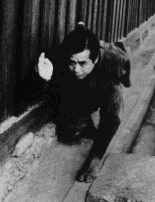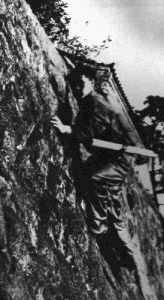Silent Stalker
by Hatsumi Sensei
(from Ninja Magazine,
Dec 1985)
 In any martial art, including ninpo, the most important
aspect is footwork; therefore I will discuss footwork and the background
of certain techniques. In any martial art, including ninpo, the most important
aspect is footwork; therefore I will discuss footwork and the background
of certain techniques.
Everyone dislikes the cold, including the ninja; so even in the
summer ninja wear tabi, Japanese socks, to keep the feet warm. The
feet are the key points of the body for retaining heat and health. In
Oriental medicine, it is called zukan no kunetsu, meaning: "Keep
the head cold and the feet warm". This is essential for staying
in good health as well as curing illness. I, personally, will always
wear tabi no matter how warm the weather.
In order to increase strength and virility, the ninja massage their
feet by holding the first three toes and rotating them. Even kunoichi
(female ninja) practice this technique to ensure-good health of the
whole body. It is particularly good for the liver; pancreas and the
entire intestinal system. Part of the technique includes rubbing the
bottoms of the feet to maintain good blood pressure and a balanced
nervous system.
 Ninja will also train by walking on beans scattered on the ground;
this helps massage pressure points as well as toughens the bottoms of
the feet. More advanced ninja eventually learn to walk on tetsubishi
(sharp-spiked caltrops) without injury; this is accomplished not only
because the feet are toughened, but because the ninja has learned to
walk with perfect balance and lightness, distributing his weight so
that he barely touches the thorny caltrops. Ninja will also train by walking on beans scattered on the ground;
this helps massage pressure points as well as toughens the bottoms of
the feet. More advanced ninja eventually learn to walk on tetsubishi
(sharp-spiked caltrops) without injury; this is accomplished not only
because the feet are toughened, but because the ninja has learned to
walk with perfect balance and lightness, distributing his weight so
that he barely touches the thorny caltrops.
Walking is an excellent exercise, and one can do it
anywhere at anytime. When I walk my three dogs every day, I walk them
briskly for three hours, making sure I take small, quick steps. It is a
good lesson to learn, even on the street for, occasionally we will
encounter a cat or something that will excite the dogs. However, since I
am always walking properly, I am always in control; I am never pulled
too fast or tripped by a tangled leash.
Two years ago I held a ninja seminar in Daytona Ohio. Most of the
American students I met there seemed to walk more like "Frankensteins"
than martial artists. They found it extremely difficult practicing the
small, quick steps. Many of them felt I walked too quickly, but I
explained that in Japan, the foot is considered the " second
heart", and to have a strong heart means to have a strong mind.
So, walking properly also develops the mind.
 Walking is the most important thing in one's life. Even classic Japanese
No plays emphasize this. Walking is the most important thing in one's life. Even classic Japanese
No plays emphasize this.
When this technique of walking is mastered, when one "walks like a
ninja", one feels as though their feet never touch the ground. It is
as though the ninja walks on air. In fact, one of my students, after
observing the demonstration, said, "Sensei, your feet are not
touching the ground. You seem to be floating in the air". Another
student, a professional soldier whose nation was at war, told me that
training of the legs (in his country) was essential; that even while in
Japan he always climbed stairs, never took the elevator. When I heard
this, I knew he was a good warrior.
Walking is the basic body movement of martial arts. When you are
learning the martial arts, be conscious of walking at all times; always
train in the aspect of taijutsu (body techniques). It will leave little
chance of your being attacked successfully. I know a professional
gunfighter who wears gloves all the time. This is a type of thinking that
is important to all martial arts: One should always be training and caring
for one's self. Training is an everyday thing, just as walking is an
everyday thing.
Side-walking (yoko aruki) ninja technique involves lowering ones center
of gravity and stepping one foot over the other. It also requires a
dance-like arm movement in order to maintain balance.
 When carrying a weapon, one walks according to the
environment and one's relationship to it. It is important to practice
side-walking in different environments. With a sword, especially at
night, the sword can be drawn and the scabbard used to " feel"
what lies ahead. When carrying a weapon, one walks according to the
environment and one's relationship to it. It is important to practice
side-walking in different environments. With a sword, especially at
night, the sword can be drawn and the scabbard used to " feel"
what lies ahead.
Next is shizumi araki or low position walking; a technique
especially useful in narrow areas. On a narrow path for example, a
lower position is better, making you less visible to a potential
attacker. Another low side-walking technique is called ninpo uzuru
gakure. Mokuton means to hide in the trees; sooton - to hide in the
grass; and sekiton - to hide in the rocks. These can all be developed
once the basic walking technique is mastered.
Whether the ninja walks alone or with others, he and they can progress
undetected if everyone walks "correctly". The obvious advantage
of walking in numbers while on a mission is that, when you are three
ninja, you are six eyes, six ears and three noses, each focused in a
different direction so that all areas are covered.
In shoten no jutsu (going up to heaven), ninja practice walking up
large plants placed at various angles, increasing the incline to as much
as 80 to 85 degrees in order to master the art of walking and climbing in
the forest. Training eventually advances to climbing plants or tree trunks
situated at 90-degree angles. After reaching the top, the ninja then learn
to tumble back down to their original position (kamae). Often, when
carrying a sword, both sword and scabbard are used to maintain balance.
Side-walking is also used while up in the trees crossing from branch to
branch. In koto ryu koppojutsu (which includes side steps and other body
techniques), the ninja can easily move backward while facing forward
simply by crossing one leg after the other. This is particularly useful
when eluding an opponent's attack and positioning ones self for a counter
attack.
Ninja no shinobi kobashiri means running in small steps with the body
leaning forward. In the night, while in the mountains, you can see the sky
between the trees. This is your path. You must also use care when near the
water or anything that might give off a reflection, lest you be detected.
(Moonlight can be an enemy as well as an ally.)
In Japan. the martial arts are not only "offensive orientated",
but very defensive as well. The Japanese are basically agricultural land
oriented people; and our martial arts have developed out of that
tradition. I hope these illustrations of basic footwork and ninja body
movement and techniques have been helpful to you.
It is good to start from the ground up. It is important
to have good feet on the ground.
This article reprinted from the
Mahoutsukai Dojo, with permission. |



